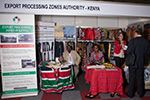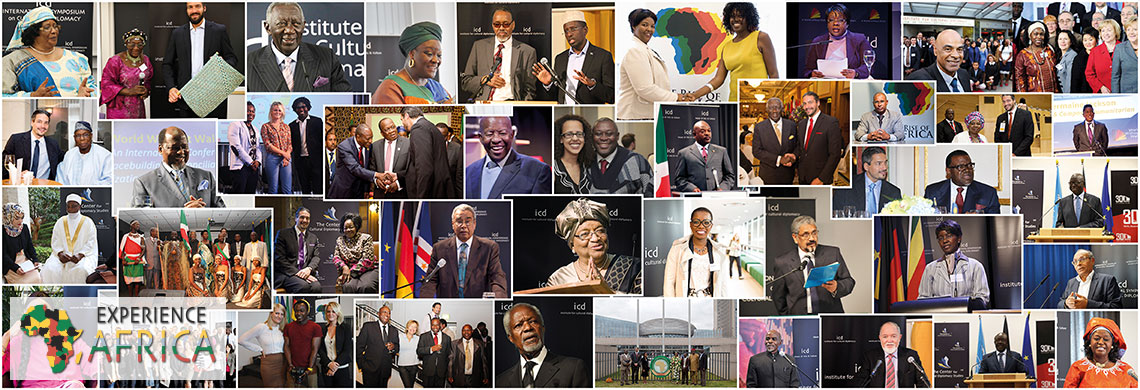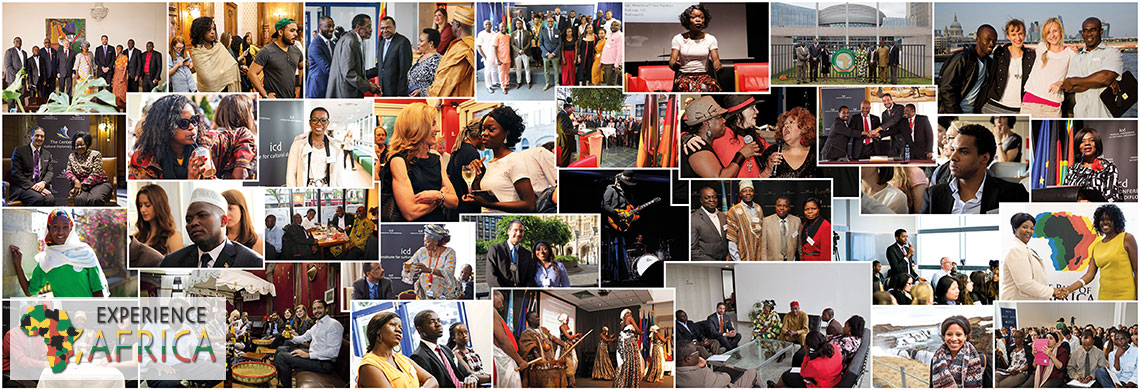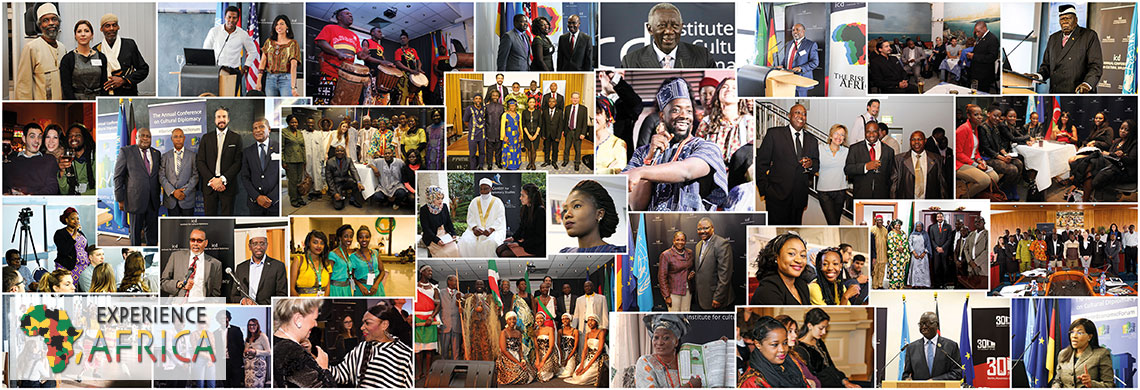The Addis Abba Summit on Cross Continental Cooperation
"The Future of the Millennium Development Goals in the African Union"
(Ethiopia, Addis Ababa; January 27th - 31st, 2014 - Held Parallel to the African Union Summit)

Innovative Examples of Cultural Diplomacy Initiatives to foster Sustainable Economic Development & Growth
The United Nations post-2015 Development Agenda underlines the need to transform economies for jobs and inclusive growth. Innovation, human creativity, and technology have the potential to improve the state of national economies and to ensure a long-term sustainable economic development. Most of all, innovative non-resource-based activities encourage economic and social inclusion of youth and women by providing them with equal opportunities to take an active part in economic activities. In addition to that, a non-traditional approach towards economy fosters sustainable consumption that builds a long-lasting bridge between the needs of the present and the ability of future generations to meet their own needs.Reports from the UN Economic Commission for Africa published in 2013 showed that between 2011 and 2013 Africa has noted a considerable economic growth of almost 5 per cent in average. This impressive "Rise of Africa" should be transformed into extensive economic diversification and social development. Innovative examples of Cultural Diplomacy to foster economic growth show how different economic activities that are based on individual creativity and invention influence a sustainable economic development. In this way it is possible to bring essential actors for the economic development together and create a wide network where knowledge can be shared and promoted.
See below a selection of Cultural Diplomacy Initiatives to foster Sustainable Economic Development & Growth:
-
1985
RURAL WOMEN'S ECONOMIC EMPOWERMENT IN ETHIOPIA
New economic ways for Ethiopian women to set up local businesses
 The international organization, Farm Africa, was established in 1985 in order to promote the belief that Africa has the power to be economically independent and that its smallholders can embrace the key to lasting rural prosperity. In Ethiopia, woman in rural areas are being empowered to manage village savings and loans groups. This enables them to start their own business such as goat fattening, baking, coffee shops and small restaurants. Natural and cultural resources make up the core of the businesses that the women are able establish. Moreover, a savings culture is being promoted in these remote areas which makes it possible for women to set money aside, make plans for their future and make profit.
The international organization, Farm Africa, was established in 1985 in order to promote the belief that Africa has the power to be economically independent and that its smallholders can embrace the key to lasting rural prosperity. In Ethiopia, woman in rural areas are being empowered to manage village savings and loans groups. This enables them to start their own business such as goat fattening, baking, coffee shops and small restaurants. Natural and cultural resources make up the core of the businesses that the women are able establish. Moreover, a savings culture is being promoted in these remote areas which makes it possible for women to set money aside, make plans for their future and make profit. -
Since 1990s
NOLLYWOOD: NIGERIA'S FAST GROWING FILM INDUSTRY
Generating cultural exposure and economic growth through cinema
 Nigeria's film industry experienced a fast growth in the 1990s and 2000s making it the second largest film industry in the world. Nigerian cinema is Africa's largest movie industry in value and in quantity of movies produced per annum. In total the Nigerian film industry is worth US $3.5 billion. The rise of affordable digital filming and editing technologies has stimulated the industry in recent decades. Most films are produced by independent companies, businessmen and investors. However, with the rise of affordable film equipment, groups of individuals shoot films with their own digital cameras with extremely low budgets and great sales nation- and region wide. In order to attract an international audience, Nigerian filmmakers are using international African actors and co-producers. Nigerian film productions are starting to be distributed further afield as Nigerian filmmakers attend internationally acclaimed film festivals. The popularity of Nigerian films is growing amongst the African and global population.
Nigeria's film industry experienced a fast growth in the 1990s and 2000s making it the second largest film industry in the world. Nigerian cinema is Africa's largest movie industry in value and in quantity of movies produced per annum. In total the Nigerian film industry is worth US $3.5 billion. The rise of affordable digital filming and editing technologies has stimulated the industry in recent decades. Most films are produced by independent companies, businessmen and investors. However, with the rise of affordable film equipment, groups of individuals shoot films with their own digital cameras with extremely low budgets and great sales nation- and region wide. In order to attract an international audience, Nigerian filmmakers are using international African actors and co-producers. Nigerian film productions are starting to be distributed further afield as Nigerian filmmakers attend internationally acclaimed film festivals. The popularity of Nigerian films is growing amongst the African and global population. -
1996
PANAFRICAN FILM AND TELEVISION FESTIVAL OF OUAGADOUGOU (FESPACO)
The oldest film festival in Africa
 The Panafrican Film and Television Festival of Ouagadougou is the biggest film festival in Africa and has been held every other year since 1969 in Ouagadougou, Burkina Faso. Only movies produced by African filmmakers are accepted into the competition. The festival gives filmmakers the opportunity to settle professional relationships, exchange ideas and promote intercultural dialogue. The main goal of the FESPACO is to support the development and growth of the African film industry through art, education, and actions to raise global awareness. The event is supported by the governments of Burkina Faso, Denmark, Finland, France, Germany, the Netherlands, Sweden, the People's Republic of China and others. The festival has also successfully contributed to the expansion of the African film industry by promoting African cinema on various international film festivals. Moreover the FESCAPO festival is one of the biggest international events held in Burkina Faso, so it has a massive positive impact on the economy, particularly in terms of tourism which contributes about CFAF 20 billion to the economy each year.
The Panafrican Film and Television Festival of Ouagadougou is the biggest film festival in Africa and has been held every other year since 1969 in Ouagadougou, Burkina Faso. Only movies produced by African filmmakers are accepted into the competition. The festival gives filmmakers the opportunity to settle professional relationships, exchange ideas and promote intercultural dialogue. The main goal of the FESPACO is to support the development and growth of the African film industry through art, education, and actions to raise global awareness. The event is supported by the governments of Burkina Faso, Denmark, Finland, France, Germany, the Netherlands, Sweden, the People's Republic of China and others. The festival has also successfully contributed to the expansion of the African film industry by promoting African cinema on various international film festivals. Moreover the FESCAPO festival is one of the biggest international events held in Burkina Faso, so it has a massive positive impact on the economy, particularly in terms of tourism which contributes about CFAF 20 billion to the economy each year. -
2001
CAPE CRAFT AND DESIGN INSTITUT (CCDI)
Promoting handmade South African products and design in the world
 The Cape Craft and Design Institute was established in November 2001 by the Provincial Government of the Western Cape and the Cape Peninsula University of Technology with the support of start-up funding from the government and the national Department of Art and Culture. The Institute promotes and supports the handmade and design sector through exhibitions, competitions, networking, research, skill trainings and many other programs. CCDI intend to expand and develop the Western Cape craft and design by supporting creative and dynamic craftsmen and designers in producing modern and high-class handmade products that indicate the cultural heritage of this region of South Africa. The beneficiaries' database of the Institute consists of more than 2500 enterprises: from small-micro businesses, many from poor communities, to top designers who have received CCDI training in exports and who sell their products at international trade.
The Cape Craft and Design Institute was established in November 2001 by the Provincial Government of the Western Cape and the Cape Peninsula University of Technology with the support of start-up funding from the government and the national Department of Art and Culture. The Institute promotes and supports the handmade and design sector through exhibitions, competitions, networking, research, skill trainings and many other programs. CCDI intend to expand and develop the Western Cape craft and design by supporting creative and dynamic craftsmen and designers in producing modern and high-class handmade products that indicate the cultural heritage of this region of South Africa. The beneficiaries' database of the Institute consists of more than 2500 enterprises: from small-micro businesses, many from poor communities, to top designers who have received CCDI training in exports and who sell their products at international trade. -
Since 2004
AFRICAN CREATIVE
A company which empowers people and promotes fair trade
 Jason Rosenstein, the founder and owner of African Creative had an innovative vision to start his own business. Instead of focusing on resources-based economic activities in Africa, he decided to promote the fair trade and collaboration between local small businesses. He started with cheap goods like beads or wires and within a few years the company became a major role in domestic and international trade. But for Mr. Rosenstein, this was not enough. Besides developing the economic position of Africa he also aimed to promote African culture, so he invited artists to create various items from decorative items threw jewelry and handbags to children's toys. His company's success shows that Africa has much to offer, and even the smallest ideas can "wire" Africa into the global economy in a fair way.
Jason Rosenstein, the founder and owner of African Creative had an innovative vision to start his own business. Instead of focusing on resources-based economic activities in Africa, he decided to promote the fair trade and collaboration between local small businesses. He started with cheap goods like beads or wires and within a few years the company became a major role in domestic and international trade. But for Mr. Rosenstein, this was not enough. Besides developing the economic position of Africa he also aimed to promote African culture, so he invited artists to create various items from decorative items threw jewelry and handbags to children's toys. His company's success shows that Africa has much to offer, and even the smallest ideas can "wire" Africa into the global economy in a fair way. -
2007
FABLABS IN SOUTH AFRICA
South Africa invests in technological and social innovation through FabLabs
 Fabrication Laboratories (FabLabs) are 'space makers' made of a small-scale workshop with computer-controlled tools. The concept emerged at the Massachusetts Institute of Technology in the 1990s. In 2007, South Africa set aside 16 million Rand to establish 10 Fabrication Laboratories around the country, providing disadvantaged communities with opportunities in the design, testing and fabrication process. The facility is a hands-on laboratory with advanced desktop manufacturing equipment that allows for the building from inexpensive and readily available materials.
Fabrication Laboratories (FabLabs) are 'space makers' made of a small-scale workshop with computer-controlled tools. The concept emerged at the Massachusetts Institute of Technology in the 1990s. In 2007, South Africa set aside 16 million Rand to establish 10 Fabrication Laboratories around the country, providing disadvantaged communities with opportunities in the design, testing and fabrication process. The facility is a hands-on laboratory with advanced desktop manufacturing equipment that allows for the building from inexpensive and readily available materials.
FabLabs not only enhance employment potential but also for the development of competitive small enterprises, the provision of enabling infrastructure for innovators and most importantly, skills development. FabLabs are also an innovative tool for a providing solution to technical and environmental problems faced by local communities; as well as the opportunity to improve education standards. -
2008
AFRICAN FASHION INTERNATIONAL
African fashion industry recognized globally
 Through fashion shows and trade events, African Fashion International aims to create platforms that will enhance the growth of the African fashion industry. African Fashion is therefore promoted during fashion weeks in London, New York or Toronto. Thanks to these emerging events, local African and heritage designers gain exposure to the international fashion industry. This enhances the opportunity for cultural and creative exchange across borders as well as the possibility for African designers to present their brands to buyers and the media. This increases the chance for African fashion to be exported to the rest world and to stimulate fashion industry on the continent.
Through fashion shows and trade events, African Fashion International aims to create platforms that will enhance the growth of the African fashion industry. African Fashion is therefore promoted during fashion weeks in London, New York or Toronto. Thanks to these emerging events, local African and heritage designers gain exposure to the international fashion industry. This enhances the opportunity for cultural and creative exchange across borders as well as the possibility for African designers to present their brands to buyers and the media. This increases the chance for African fashion to be exported to the rest world and to stimulate fashion industry on the continent. -
2010
AFRICA UNSIGNED
Music agency promoting emerging African artists
 Africa Unsigned is a start-up music agency that promotes African artists. Since 2010 Africa Unsigned has invested over €500,000 in helping more than 40 African artists and bands release albums that represent the "new African sound". The agency depends first of all on a fan-funding platform by connecting fans directly to musicians. Through "crowdfunding", artists raise money for the recording, distribution and promotion of their music. The initiative aims to develop and expand the African music industry, especially as the music business is expected to bloom in the near future. It is thought that the industry could develop as the continent's new face to the world and a pillar of global pop culture.
Africa Unsigned is a start-up music agency that promotes African artists. Since 2010 Africa Unsigned has invested over €500,000 in helping more than 40 African artists and bands release albums that represent the "new African sound". The agency depends first of all on a fan-funding platform by connecting fans directly to musicians. Through "crowdfunding", artists raise money for the recording, distribution and promotion of their music. The initiative aims to develop and expand the African music industry, especially as the music business is expected to bloom in the near future. It is thought that the industry could develop as the continent's new face to the world and a pillar of global pop culture. -
Since 2011
GREEN TALENT
Creating a Green Africa
 The company called Green Talent tackles the challenge of bringing green economy solutions to Africa. The inventors of this concept believe in a better, sustainable, and eco-friendly Africa. The company promotes and offers various programs for employers and employees; it also conducts research in the field of sustainable economy. Since its establishment, Green Talent clearly shows the interest towards the establishment of creative and sustainable economic activities in Africa. Each year the company offers new programs and events for similar projects in order to re-shape the thinking of sustainable development in Africa and to bring a long-term change in the African economy.
The company called Green Talent tackles the challenge of bringing green economy solutions to Africa. The inventors of this concept believe in a better, sustainable, and eco-friendly Africa. The company promotes and offers various programs for employers and employees; it also conducts research in the field of sustainable economy. Since its establishment, Green Talent clearly shows the interest towards the establishment of creative and sustainable economic activities in Africa. Each year the company offers new programs and events for similar projects in order to re-shape the thinking of sustainable development in Africa and to bring a long-term change in the African economy. -
2011
MUSIC IN AFRICA PROJECT
African music and networking portal connecting artists from around the globe
 The "Music in Africa Project" was initiated in 2011 by Siemens-Stiftung and the Goethe-Institute, together with partners from across Africa. The Music in Africa Project aims at offering reliable and useful information about the African music sector through an innovative online platform. This platform enables cross-cultural information exchanges amongst musicians, researchers, cultural operators, educators and music fans. The project enhances the awareness of the African music scene and the cooperation among people from the music industry on a regional and international level, thus expanding the promotion and investments into the African music industry.
The "Music in Africa Project" was initiated in 2011 by Siemens-Stiftung and the Goethe-Institute, together with partners from across Africa. The Music in Africa Project aims at offering reliable and useful information about the African music sector through an innovative online platform. This platform enables cross-cultural information exchanges amongst musicians, researchers, cultural operators, educators and music fans. The project enhances the awareness of the African music scene and the cooperation among people from the music industry on a regional and international level, thus expanding the promotion and investments into the African music industry. -
2011
NEXT GENERATION SOCIAL SCIENCES IN AFRICA
Supporting the next generation of Africa is an investment in the future of Africa
 The Next Generation Social Sciences in Africa program was established in 2011 by The Social Science Research Council (SSRC) with the aim of supporting the next generation of African academics working on peace, security and development issues. The program provides fellowships to nurture intellectual development in Ghana, Nigeria, South Africa, Tanzania, and Uganda. The program was founded by Carnegie Corporation of New York. Innovative research on topics such as economic growth and peace development from local as well as global perspectives are encouraged with the aim of mobilizing necessary knowledge on various public issues. Ultimately the idea is that that justice, prosperity, and democracy all require better understanding of complex social, cultural, economic, and political processes.
The Next Generation Social Sciences in Africa program was established in 2011 by The Social Science Research Council (SSRC) with the aim of supporting the next generation of African academics working on peace, security and development issues. The program provides fellowships to nurture intellectual development in Ghana, Nigeria, South Africa, Tanzania, and Uganda. The program was founded by Carnegie Corporation of New York. Innovative research on topics such as economic growth and peace development from local as well as global perspectives are encouraged with the aim of mobilizing necessary knowledge on various public issues. Ultimately the idea is that that justice, prosperity, and democracy all require better understanding of complex social, cultural, economic, and political processes. -
2013
AFRICAN CREATIVE MARKET
Introducing the richness of the African culture
 The annual African Creative Market was hosted from 6th until 13th of October 2013 in Cape Town. The market takes place parallel with the annual African Creative Economy Conference, which focuses on introducing a more complex historical and cultural vision of Africa. During the ACM, attendees can experience various events, such as the uniqueness of African cultural heritage expressed through music, dance, film, literature, visual arts and crafting. The main purpose of this event is to promote cultural, economic, and political cooperation domestically and internationally. Although the majority of guests and speakers come from Africa, every year more and more guests and speakers come from different continents - like Europe and America.
The annual African Creative Market was hosted from 6th until 13th of October 2013 in Cape Town. The market takes place parallel with the annual African Creative Economy Conference, which focuses on introducing a more complex historical and cultural vision of Africa. During the ACM, attendees can experience various events, such as the uniqueness of African cultural heritage expressed through music, dance, film, literature, visual arts and crafting. The main purpose of this event is to promote cultural, economic, and political cooperation domestically and internationally. Although the majority of guests and speakers come from Africa, every year more and more guests and speakers come from different continents - like Europe and America. -
2013
AFRICAN DESIGN ON THE GLOBAL MARKET
Trade event bringing together international designers and buyers to Africa
 Source Africa is a trade event that took place for the first time in April 2013 in Cape Town, South Africa. Source Africa is a two-day trade exhibition and designer showcase featuring more than 100 African exhibitors as well as regional and international buyers, business leaders, decision makers and service providers. This event encourages links between design professionals from around the globe; it enhances not only intercultural communication, but also investment into manufacturing capacity in Africa and accelerates job creation for many years to come. The event puts African fashion and design on the international map as sophisticated, original elements from African culture and as a new and promising investment. The trade show was made possible by USAID's regional experts joining forces with private enterprises and at the opening of the show Director General of the South African Department of Trade and Industry, Lionel October, highlighted the importance of collaboration with the US to strengthen the sector. The Source Africa trade event will take place for the second time in 2014.
Source Africa is a trade event that took place for the first time in April 2013 in Cape Town, South Africa. Source Africa is a two-day trade exhibition and designer showcase featuring more than 100 African exhibitors as well as regional and international buyers, business leaders, decision makers and service providers. This event encourages links between design professionals from around the globe; it enhances not only intercultural communication, but also investment into manufacturing capacity in Africa and accelerates job creation for many years to come. The event puts African fashion and design on the international map as sophisticated, original elements from African culture and as a new and promising investment. The trade show was made possible by USAID's regional experts joining forces with private enterprises and at the opening of the show Director General of the South African Department of Trade and Industry, Lionel October, highlighted the importance of collaboration with the US to strengthen the sector. The Source Africa trade event will take place for the second time in 2014. -
17 - 21 February 2014
SOCIAL MEDIA WEEK LAGOS 2014
Development of social media in Africa
 Social Media Week is a series of events held worldwide which is subjected to the examination of the impact of social media and technology on society, culture and economy while analyzing current trends and opportunities for this new sector. The Social Media Week 2014, organized under the theme "A connected Africa is the future: Exploring the potential of social media and technology for African continent", was held for a second time in Lagos, Nigeria. The event aimed to be more social, interactive and productive by means of engaging local contents, workshops, discussions and seminars. The most influential specialists, brands, agencies and start-ups of the continent gather in Nigeria to share best practices, inspiration and ideas as well as to examine the power of social media and technology in forming a prosperous and sustainable future for Africa.
Social Media Week is a series of events held worldwide which is subjected to the examination of the impact of social media and technology on society, culture and economy while analyzing current trends and opportunities for this new sector. The Social Media Week 2014, organized under the theme "A connected Africa is the future: Exploring the potential of social media and technology for African continent", was held for a second time in Lagos, Nigeria. The event aimed to be more social, interactive and productive by means of engaging local contents, workshops, discussions and seminars. The most influential specialists, brands, agencies and start-ups of the continent gather in Nigeria to share best practices, inspiration and ideas as well as to examine the power of social media and technology in forming a prosperous and sustainable future for Africa.



